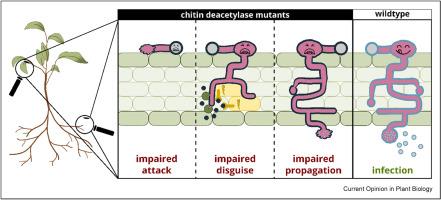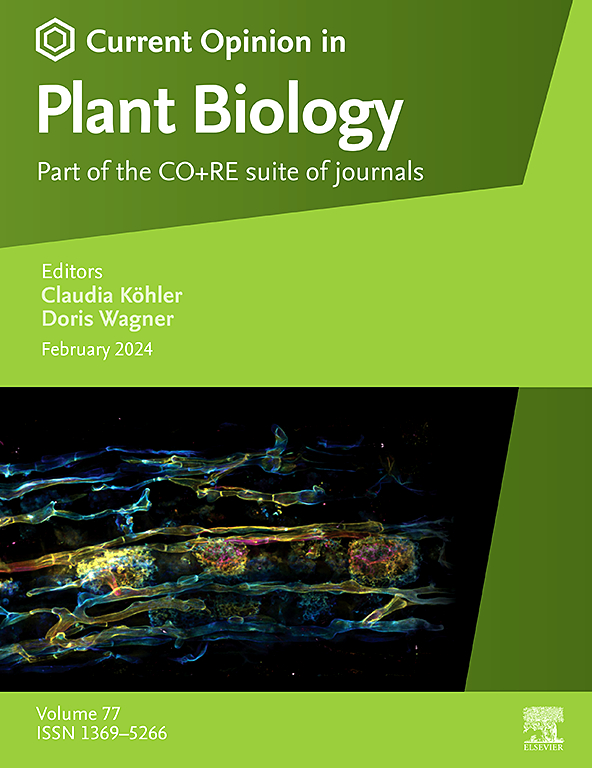甲壳素和壳聚糖--发现与伪装、依恋与成就的故事。
IF 7.5
2区 生物学
Q1 PLANT SCIENCES
引用次数: 0
摘要
几丁质聚合物是真菌细胞壁的重要结构成分,但宿主几丁质酶会削弱它们,从而导致真菌病原体的抗病性。由此产生的几丁质低聚物是免疫原性信号分子,可激发其他抗病机制。真菌可通过部分脱乙酰化几丁质,将其转化为壳聚糖,保护细胞壁免受几丁质酶的攻击,并使诱导剂活性寡聚体失活,从而抵消这些机制。通过突变单个或多个几丁质脱乙酰化酶基因,对真菌致病性的这一分子隐身假说进行了反复测试,结果支持了这一假说,但同时也表明几丁质脱乙酰化在毒力中的其他作用,如表面附着和感应、宿主组织穿透和定植,以及孢子的形成、稳定和萌发。有趣的是,最近有证据表明,寄主植物通过抑制真菌几丁质脱乙酰酶进化出了对抗策略,这进一步证实了这些酶作为致病性/毒力因子的作用,并可能为新型功能性杀真菌剂提供了线索。本文章由计算机程序翻译,如有差异,请以英文原文为准。

Chitins and chitosans–A tale of discovery and disguise, of attachment and attainment
Chitin polymers are an essential structural component of fungal cell walls, but host chitinases can weaken them, contributing to disease resistance in fungal pathogens. Chitin oligomers thus produced are immunogenic signal molecules eliciting additional disease resistance mechanisms. Fungi may counteract these, e.g. by partial deacetylation of chitin, converting it into chitosans, protecting the cell walls against chitinase attack, and inactivating elicitor active oligomers. This molecular stealth hypothesis for fungal pathogenicity has repeatedly been tested by mutating single or multiple chitin deacetylase genes, supporting the hypothesis but simultaneously suggesting additional roles for chitin deacetylation in virulence, such as surface attachment and sensing, host tissue penetration and colonization, as well as spore formation, stabilization, and germination. Interestingly, recent evidence suggests that host plants have evolved counter strategies by inhibiting fungal chitin deacetylases, lending further credibility to the suggested action of these enzymes as pathogenicity/virulence factors, and possibly offering leads toward novel functional fungicides.
求助全文
通过发布文献求助,成功后即可免费获取论文全文。
去求助
来源期刊

Current opinion in plant biology
生物-植物科学
CiteScore
16.30
自引率
3.20%
发文量
131
审稿时长
6-12 weeks
期刊介绍:
Current Opinion in Plant Biology builds on Elsevier's reputation for excellence in scientific publishing and long-standing commitment to communicating high quality reproducible research. It is part of the Current Opinion and Research (CO+RE) suite of journals. All CO+RE journals leverage the Current Opinion legacy - of editorial excellence, high-impact, and global reach - to ensure they are a widely read resource that is integral to scientists' workflow.
 求助内容:
求助内容: 应助结果提醒方式:
应助结果提醒方式:


